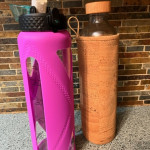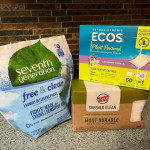Disease Burden From Plastic Exposure
I thought recent research that was published this month in the Journal of the Endocrine Society was worth reviewing, since it has impact on our health and may encourage us to make small changes in our daily habits. We know as health care providers that exposure to endocrine-disrupting chemicals (EDCs) via daily use of plastics is a major contributor to the overall disease burden in the United States. This recent large-scale analysis however revealed that the associated costs to society amounts to more than 1% of the gross domestic product. In 2018 the disease burden attributable to EDCs used in the manufacture of plastics added up to almost $250 billion!
Plastics may contain various EDC’s, such as polybrominated diphenylethers in flame retardant additives, phthalates in food packaging, bisphenols in can linings, and perfluoroalkyl and polyfluoroalkyl substances (PFAS) in nonstick cookware.
These chemicals have been shown to leach and disturb the body’s hormone systems, increasing the risk for cancer, diabetes, reproductive / endocrine disorders, and neurological impairments. Unfortunately the impact of these substances contributing to poor health may begin in utero and span the lifetime.
How to Reduce Exposure


So what do I tell my patients today to help them reduce their exposure to EDCs? There are simple steps that can be taken; it just takes a bit of a change in your daily routine. First of all use a re-usable bag when grocery shopping! Did you know that some grocery stores are eliminating plastic bags entirely or charging you for each plastic bag if that is your preference?
Don’t drink out of plastic water bottles routinely. Not only is it bad for your health, but it is bad for the health of the ocean too. Purchase a water filtration system, and re-fill! Use only glass or stainless steel containers for drinking water.
Store left-over food in glass containers, using mason jars is an inexpensive alternative. Minimize plastic wrap and never directly apply to the surface of food, the wax wraps are a viable alternative to some food storage needs. Also don’t microwave anything that is plastic or styrofoam even if it says “microwave safe”. Many chemicals used in plastic are not stable and heat facilitates leaching into food, which would also bring up the concern of putting any plastic container in a dishwasher. Only cook with ceramic, stoneware, stainless steel or cast iron pots or pans. Obviously avoid plastic cutlery, plastic straws and single serving coffee pods. Another strategy to reduce chemical exposure is by eliminating canned goods in recipes, find replacement items that are either bulk like beans or in glass jars such as tomato sauce. Obtain your meat / fish at a market or through a farmer’s co-op that wraps it in paper, avoiding the pre-packaged plastic shrink wrapped meats.
For laundry, use only environmentally friendly detergent and fabric softener sheets, ditch the large plastic bottles that the liquid versions are stored in. What about personal care? Use bar soaps and re-fillable hand soaps, razors that only replace the head, and evaluate all body care products through the Environmental Working Group (EWG) for toxicity level. Recently I purchased a eco-friendly deodorant that comes in a cardboard “tube” instead of plastic.
Lastly, and if finances allow, only purchase clothing and bedding that is free of chemicals especially flame retardants. One of the most important areas to make non-toxic or “green” is your bedroom. In particular your mattress and linens should be certified chemical free or organic since hopefully you are spending a substantial amount of your day in close contact! Recycling is a debatable issue and can be a helpful solution depending on your location. Society must address the root problem: plastics are shockingly profitable and cheap because manufacturers do not pay for the abundant harm they cause! Luckily, many innovative companies are tackling alternatives to plastic which will help solve the plastic pollution crisis. Until then we must all take small steps to help bring about change. Now if I could just remember to bring the canvas bags into the store instead of leaving them in the car… I guess I take extra steps that way!

Feb 21, 2024 at 1:59 PM
Thanks, Nancy, for the plastics reminder. I have been sloppy and forgotten to practice some of these measures. Detoxing personal products like toothpaste, shampoo, laundry soap and filtering water have been hit and miss this last year. I'll have to put out better efforts for my family here in Ohio. Thanks for the reminder. It was much appreciated. I am a patient of Dr. Pickens. I thank God for both of you in my life.